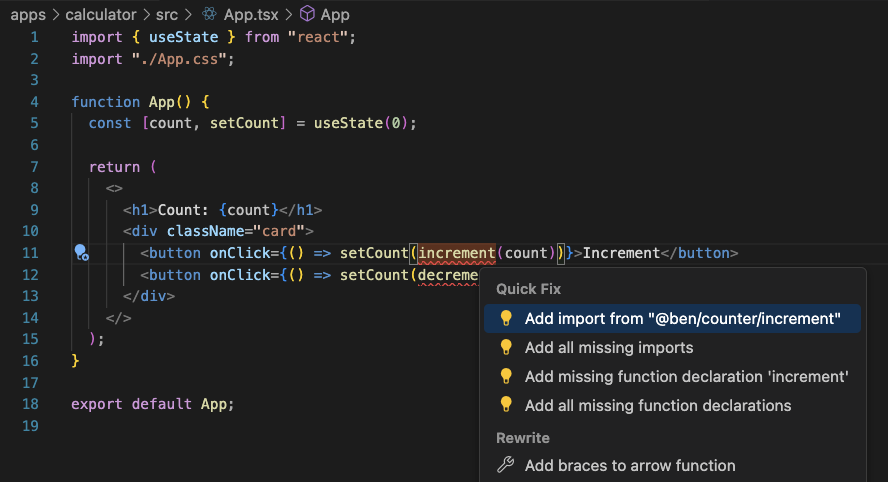Create reusable javascript packages with workspaces
Workspaces are a great way to create modular reusable code in the javascript ecosystem. npm will automatically link packages in the node_modules folder. Previously you had to manually do that via npm link. Workspaces enable multiple projects in a single repository creating a mono repository.
Modular packages means your code is better organized, smaller, easier to test, and has fewer dependencies. Let's create a simple demo that uses npm workspaces.
Let's start by adding our workspaces to a package.json at the root of the project directory. We'll have a directory for packages and a directory for applications.
{
"name": "workspaces",
"workspaces": ["packages/*", "apps/*"]
}Let's create our first package called counter in a packages directory.
$ mkdir packages
$ mkdir packages/counter
$ cd packages/counter
$ npm init --scope=@ben --yes
Wrote to /workspaces/packages/counter/package.json:
{
"name": "@ben/counter",
"version": "1.0.0",
"main": "index.js",
"scripts": {
"test": "echo \"Error: no test specified\" && exit 1"
},
"keywords": [],
"author": "",
"license": "ISC",
"description": ""
}Scope is a way of grouping related packages together. A lot npm and pnpm features give you the ability to execute commands across scoped packages.
Next, let's add typescript as a dev dependency and initialize it.
$ npm i -D typescript
added 1 package, and audited 202 packages in 604ms
41 packages are looking for funding
run `npm fund` for details
found 0 vulnerabilities
$ npx tsc --init
Created a new tsconfig.json with:
target: es2016
module: commonjs
strict: true
esModuleInterop: true
skipLibCheck: true
forceConsistentCasingInFileNames: true
You can learn more at https://aka.ms/tsconfigLet's add some source code.
$ mkdir src
$ touch src/increment.ts
$ touch src/decrement.tsconst increment = (a: number): number => a + 1;
export { increment };const decrement = (a: number): number => a - 1;
export { decrement };Next let's update our exports field in the package.json file to specify our entrypoints for the counter package. Being explicit with package exports will give your code editor better auto-completion and prevent [/blog/what-is-a-barrel-file](barrel files).
{
"name": "@ben/counter",
"exports": {
"./increment": {
"default": "./src/increment.ts"
},
"./decrement": {
"default": "./src/decrement.ts"
}
},
"devDependencies": {
"typescript": "^5.6.2"
}
}Let's create an app called calculator.
mkdir apps
cd apps
npm create vite@latest calculator -- --template react-ts
> npx
> create-vite calculator --template react-ts
Scaffolding project in /workspaces/apps/calculator...
Done. Now run:
cd test
npm install
npm run devlet's add the @ben/counter package as a dependency
$ cd calculator
$ npm i @ben/counter
up to date, audited 202 packages in 595ms
41 packages are looking for funding
run `npm fund` for details
found 0 vulnerabilitiesWe can verify the package has been added
"dependencies": {
"@ben/counter": "*",
"react": "^18.3.1",
"react-dom": "^18.3.1"
},Replace the vite template boilerplate code with:
import { useState } from "react";
import "./App.css";
import { increment } from "@ben/counter/increment";
import { decrement } from "@ben/counter/decrement";
function App() {
const [count, setCount] = useState(0);
return (
<>
<h1>Count: {count}</h1>
<div className="card">
<button onClick={() => setCount(increment(count))}>Increment</button>
<button onClick={() => setCount(decrement(count))}>Decrement</button>
</div>
</>
);
}
export default App;Not only can we use the @ben/counter package but we also get intellisense.


Let's verify it works